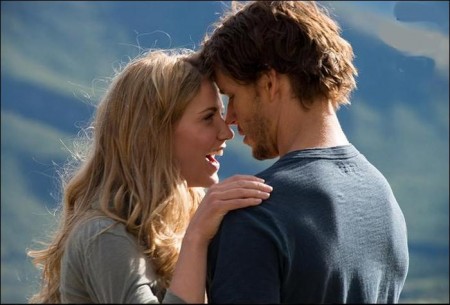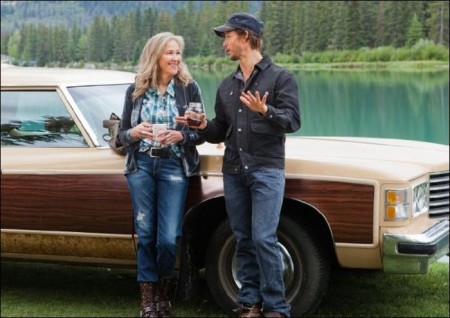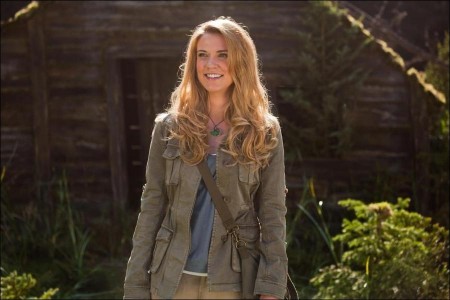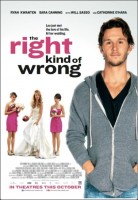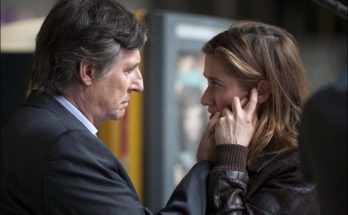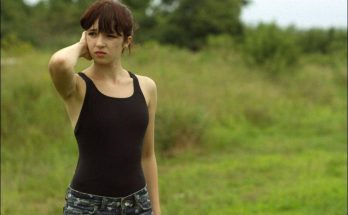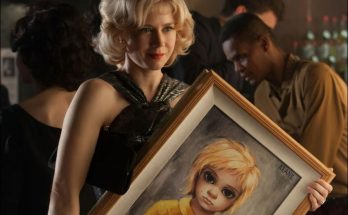Taglines: Leo just met the love of his life. At her wedding.
Leo Palamino has dedicated his life to what some may call impossible dreams. At least his ex-wife Julie would call them that. But Leo is an expert at not listening to her criticism or anyone else’s for that matter because Leo is a stubborn romantic… An idealist. A dreamer. And to dream big, impossible dreams you can’t listen to the people who tell you that’s what those dreams are.
It is precisely this refusal to listen to criticism that drove his ex-wife Julie to blog about Leo’s flaws as their relationship broke down. A blog… called Why You Suck that would become a cultural phenomenon. And so when we meet Leo Palamino, he is a romantic dreamer, a dedicated writer, a dishwasher in a tourist trap, and a celebrity…
The Right Kind of Wrong is a Canadian romantic comedy film directed by Jeremiah S. Chechik, based on the 1987 novel Sex and Sunsets by Tim Sandlin. Its premiere was in the Gala Presentation section at the 2013 Toronto International Film Festival
“Nothing is impossible.”
Challenging the impossible is the single, dominating theme in The Right Kind of Wrong.
Leo Palamino believes in love, he believes in the underdog, he believes in his writing, and he believes in himself. “Leo is bold, he’s brash, brazen and brilliant. He’s a rolling stone that gathers no moss. He sees the world through boundless eyes, utterly convinced that if he stays true to his convictions, no matter what, he will succeed,” says actor Ryan Kwanten who was plucked out of the Deep South of “True Blood” and transported to the majestic Rocky Mountains in Alberta, Canada to play this role.
Producer Robert Lantos, also has a certain affinity for the notion of challenging adversity and the theme crops up in many of his films, dating back to his first feature in 1978, In Praise of Older Women, which was the quest for a new world and the elusive love of an older woman. “I’m inspired by stories about overcoming the impossible. This may have something to do with my own history or perhaps just my flights of fancy. I don’t set out to make movies on this theme, but somehow it seems that this is what they end up being about.”
In The Right Kind of Wrong, a romantic comedy, or perhaps a comedy about the madness of romance, based on a script by Megan Martin adapted from the novel, Sex and Sunsets, by Tim Sandlin, Lantos was won over by the whimsical audacity of the central character’s refusal to concede to defeat. “Leo doesn’t have a chip on his shoulder about the fact that he’s washing dishes for a living even though he is a writer. I think if you do believe the impossible exists, then you make your own wishes come true and things become possible.”
“That is the theme of The Right Kind of Wrong: in love, there are no boundaries and there are no obstacles. It’s a fantasy that is fun to subscribe to from time to time and if you do, you’ll root for Leo and feel romantically transported to where you can believe what Leo, our hero, says, which is that nothing is impossible,” said Lantos.
Screenwriter Megan Martin was determined that Leo be someone “who refuses to make the subtle adjustments that could help him move forward in life. Leo can be prickly, he can over-react to the conventional. I’m attracted to people like this. They can drive you nuts, they can say the wrong thing, but they make life so interesting.” The other quality crucial for Martin was “that Leo not be pretentious. In fact, he’s the opposite. Leo does not care about his reputation. He is guided by impulse and gives over to his pursuits wholeheartedly. There is an honesty in Leo we can all aspire to.”
Whirling around Leo are the central characters in the story: Colette, her new husband, Danny Hart and her mother, Tess. Colette, played by Sara Canning, is a young woman, raised by Tess (Catherine O’Hara), a dope-smoking, Impala-driving renegade academic mother who treasures her freedom. She knows her daughter’s heart and as much as she wishes happiness for Colette, she doubts whether that can be found with someone like Danny, who drives a… Hummer (as good as a character assassination in Tess’ books).
Danny Hart (Ryan McPartin), on the other hand, is actually a good guy who happens to come from money and has shrewdly parleyed that into a career as a lawyer after spending his youth as an Olympic athlete. As her husband, Danny becomes Colette’s entrée into a lifestyle she has long coveted. It’s a world similar to her own – just a lot more comfortable. And while it looks similar to the life she came from, it’s not the same and the question stands: is this where a free spirit such as herself belongs? Tess doesn’t think so. Leo doesn’t, either.
Director Jeremiah Chechik, who knows about making films about love and eccentric men from when he helmed Benny & Joon, first read the novel Sex and Sunsets in the late 1990s and was drawn in by the “original tone” of the story. “There was a quirkiness to these characters. I like everyman characters facing extremely unusual circumstances, or the opposite, very unusual characters facing the quirks and challenges of every day emotional life, which is right where this book places itself. So I gave it to Robert, who I’d known a long time, and we began the process of development,” noted Chechik. The circumstances in which these characters find themselves is a culture which discourages independence of thought in favor of a safer and more pragmatic existence. The clash of cultures is embodied in the triangle of Leo, Colette and Danny. “Here we have Colette, who has suspended her politics, her ethics, and her uniqueness to run to a safe place with a wonderful man, Danny, and then finds herself discovered, quite by accident, by Leo, an honest, fearless spirit. And so begins their journey together – this dance of reconciling each of their identities.”
The dance, as Chechik called it, would have been a sweet waltz of discovery if not for the certain unusual circumstances, namely Leo’s ex-wife, Julie (played by Julie Hagar) – and therein lies the comedy of Leo’s quest in The Right Kind of Wrong. Infused in the story is a realism about love; Colette is not Leo’s first love – Julie was, except she did not appreciate his artistic aspirations. She was a pragmatist in the purest sense. Things did not go well and the marriage ended – or at least, Leo thought it was over. Julie wasn’t nearly finished with him.
While most estranged spouses exact their revenge in the courts of law, Julie opted for the court of public opinion. People blog for many reasons: creativity, community, wealth, fame, even identity. Julie was motivated by spite and her own heartbreak about their failing relationship. As much as Leo’s artistic integrity made him the immovable object that logic and reason could not budge, Julie became the irresistible force, the unstoppable mouth. She found her voice in his flaws.
“The blog became an outlet for Julie to just write about her feelings and her frustrations with her husband,” explained Kristen Hager who plays the ex-wife. “She starts sharing the blog with her friends, initially as a joke. At first, Why You Suck is just a funny title that Julie uses to get a reaction from Leo. He’d been indifferent for so long that she wants to hurt him, thinking this will motivate him to pay attention and make an effort to fix what’s wrong with the relationship.”
It doesn’t work. One of Julie’s main complaints that she trumpets in the blog is that when Leo gets a potential book deal from a big publisher, he rejects their edits, and the deal dies – something else Julie trumpets in the blog. “Leo writes with a single goal, a single purpose,” Kwanten noted. “He did things his way because if it wasn’t his work, he’d disown it.
To survive, he is a dishwasher in Mount Yalo, an upscale resort town. “He takes dishwashing seriously. He’s a zen dishwasher – when he washes dishes, he’s fully in the moment. People come from other restaurants to watch him wash dishes because he turns it into a performance like Tom Cruise did in Cocktail. He has no embarrassment of any kind,” observed Lantos.
Leo may be pure and completely true to himself, but do his convictions keep him warm at night? Evidently not. While Julie, the broken marriage and the blog are the crucible which has forged Leo’s resolve, the beating heart of the story begins with … a football.
Across the street from Leo’s house a wedding is about to take place. The bride appears, the football lands at her feet. “Time stops, literally,” Kwanten illustrated, “and every single sort of nuance on the face is played out. She’s wearing a wedding dress, the train, all that, she picks up the football in one hand, hikes up the leg and the dress… and with the other, she tosses the ball up, kicks and it sails over the house. It was the moment that changes Leo’s life.” The flash of a white lace garter didn’t hurt, either.
During the casting for the movie, Ryan Kwanten arrived for his first meeting with Lantos and Chechik on a bicycle. It could have been a coincidence or it could have been a smart move, although IMDB.com reports that Kwanten “unknowingly left his bicycle in Steven Spielberg’s parking space at their first meeting.” Either way, “the character of Leo doesn’t have a car, he can’t afford one and even if Leo could, he wouldn’t drive. He exists outside those kinds of conventions,” noted Lantos. “That’s the first perception you get of Ryan when you meet him: he’s self-effacing which is pretty rare for a rising Hollywood star. He has no preconception of how he should present himself. Rather, he’s exactly what he is: quirky and fearless. He’s a surfer, he swims in ice-cold water every day of his life in Los Angeles. He bikes and in our film he hang-glides. He’s fearless in everything he does and that’s the central trait of this character as well. I knew his work, but I didn’t know him. And then when we met, it all clicked.”
For the role of Leo, Chechik and Lantos were looking for an actor with an openness, an honesty and a sense of nuance. “The Right Kind of Wrong isn’t a broad comedy,” said Chechik, “and yet it’s extremely funny in its originality of tone. Ryan brings to it a very specific fresh, intense energy – both intense from the point of view of focus and also commitment.”
By all accounts, it seemed as if Kwanten bonded with the character during his first read of the script, starting with the character’s name. “Can’t stop saying that name. Love that name. Leo P a l a m i n o. It actually gets said a lot during the film. It rolls off the tongue.” And then there’s the Palamino philosophy of living life with no shame, no regrets. Kwanten confessed, “Even when I was reading I was turning the pages thinking, I want to be this guy. I wish I had the tenacity and the kind of the fortitude to just say, “Yes!” You know, ‘I want to act on that impulse.’”
In one of those genuinely rare moments, Kwanten truly believed he grew as a person as a result of playing the role. “I would like to think Leo’s almost made me a better man for the fact that I am going to question things in life now, not let things slide by and attacking things a little bit more, not in an aggressive way, but getting out there and doing it all.”
Now take this Tasmanian devil (Sydney, Australia, actually) of energy and integrity, and place him foursquare in front of the girl he falls in love with, Colette, played by Sara Canning. The football moment when they meet afforded Canning an exhilarating opportunity between actors. “I had the pleasure of seeing Ryan’s face in that second and it sets the story in motion 100 percent. It’s was pretty fantastic,” she said. This is where Leo transforms from being the immovable object, which he was with Julie, to being the irresistible force with Colette. “Nothing will stop him,” Canning continued. “It tests his moral core, his integrity and ultimately, this is why Colette falls for him.”
Love at first sight is one of those enduring mysteries that the majority of us believe in and surveys show more than half have experienced. That the object of such affection is a married woman is as classic a dilemma as Paris and Helen of Troy. The challenge for Leo is that Colette believes in her heart that the man she is marrying, Danny, is the man of her dreams. So, does this make Leo a lunatic nuisance or smarter than everyone else in the room?
“Colette is a strong-willed woman,” observed Canning, “and, at first, she’s really not having this crazy pursuit from Leo, bombarding her at work and doing crazy things all over town. But somehow, he manages to find his way in.” At first, Leo’s demented behavior substantiates the claims Julie makes in her blog-turned-book. “But bit by bit, Colette begins to see a lot of her own traits reflected in Leo’s actions. The more time she spends with Danny, his family and his friends, the more she realizes Leo might not be too far off the mark. Colette has a great line after she reads Julie’s book and the blog and she says to Leo, “You know, a lot of the things she [Julie] calls wrong don’t seem wrong to me.””
“From my first chemistry test with Ryan, I really hoped that this would all work out and I’d be sitting here in this gorgeous location shooting this film,” said Canning. “I think he’s perfect for Leo. We laugh all the time. We laugh in between all these really difficult scenes that we have to shake it off. And he’s right there. There’s no transition for him between his crazy lovely self, off-camera and then what he brings to a scene. It’s great to watch him and to play with him.”
Kwanten returned the affection in his observations about Canning, when he wasn’t ducking her cross punch. “Sara brings such an exuberance to that character. I don’t think the girl actually sleeps. She’s sort of permanently buzzed. And she loves this character, she loves the story and I couldn’t ask for sort of a better co-star.”
The wisdom, or horse sense, comes from Tess, Colette’s mother, handily played by SCTV-alumni, Catherine O’Hara. “I think Tess and Leo are kindred spirits in that they are loose cannons and a little nuts. Both Leo and Tess see that Colette is going in the wrong direction and they agree on that, even though they’re strangers to each other. They’re in on it together to break up her marriage so that she can be happy with Leo.”
Playing the mother of the bride is a bit of a slam dunk in terms of what one might expect, but this is Catherine-Beetlejuice-Dick Tracy-“The Larry Sanders Show”-Best in Show-A Mighty Wind-Frankenweenie-O’Hara. About the kindred spirit bonding between mother-of-the-bride and interloper concept, O’Hara said, “It’s about me. The mother always thinks it’s always about the mother! It’s about the mother and what she wants for her daughter. And mostly she wants what she would want if she were Colette. She actually says, “You know, if I were a few years younger I’d do you.” It’s most inappropriate. So really … you hear me say that… If that line ends up being in the movie…”
This white knight that Colette marries is Danny Hart. Ryan McPartlin is cast as the man Colette loves. It’s important to know he loves her right back, in a good way, the best way he knows. There is nothing wrong with Danny Hart, apart from Tess’ assessment that “he’s a pain.” But he’s not a bad guy and his heart is in the right place. “He’s from a well-to-do family, and he’s fallen in love with Colette. He just wants to give her the life that he’s always dreamed of and share it with her. Because he’s very sensitive to his wife and who she is, he doesn’t try to change who she is. He allows her to be herself, but he also wants her to understand and respect the rules he has to live by in his blue-blooded world in the same way that he’s trying to respect her wild nature,” McPartlin explained.
Danny Hart is, above all else, a confident man. When challenged by Leo, he does not honestly believe that his new wife would leave him and the perfect life he offers. At first, Leo is nothing but a stalker. Then he becomes a nuisance. “Once Danny sees that Leo is inside of Colette’s head, he takes a stand and uses the power that he has within his world to threaten him,” said McPartlin. On working with Sara Canning, he summed up his experience succinctly, “She’s adorable. What’s not to like about her. There is no better person that I’ve worked with.”
All in all, Leo Palamino’s dreams are a little like the white bear who appears at various moments during the story, improbable and unpredictable. More than just an imaginary plot device, the white Kermode bear, also known as a ‘spirit bear’ is a cream-colored black bear and quite real – albeit rare.
Location, Location, and Oh, What Locations
“The Rocky Mountains is the marrow of the world,” – Robert Redford as Jeremiah Johnson (1972)
Mount Yalo. There is something about mountain living that is like nothing else in the world. Mother Nature shares her bounty equally with the rich and the poor. This is essential to understanding the character and sense of justified entitlement of writer / dishwasher Leo Palamino who lives side by side with blueblood Danny Hart, both sharing the inexplicable beauty of the mountains as well as the attentions of Colette.
Unlike city living where income dictates the quality of the view, every resident in a luxury ski resort town is the beneficiary of spectacular scenery. The air is sweet, the sky is big and everyone enjoys the unspoiled wilderness as equals. The problem is that Danny and his friends do not exactly view Leo as an equal. Perhaps then, geography becomes biography.
It is one thing to set a novel in the mountains and then to adapt a script into such a beautiful setting, but it’s entirely something else when filmmakers have to deliver landscapes that are breathtaking. On that very point, Lantos gravitated to Banff, Alberta, with vistas of unparalleled beauty. It would seem to be the ideal solution to a script problem, but yet even in Banff, it was not easy to find a location that hasn’t already been made in a postcard and mailed around the globe. “We were looking for something that we couldn’t find anywhere else,” noted Lantos. “And we looked everywhere. We wanted an authentic, but upscale opulent ranch with a lot of flat land around it and mountains in the background. We found one piece or another, but not the whole thing.
Finally we sent the helicopter up to fly around Alberta, they took pictures and we saw Willow Bend Ranch. And so we came and looked at it and this is exactly how we imagined the Hart ranch to look. The bonus was when we went inside the house and discovered that the owner was a big-game hunter with a living room like a zoo except the animals had all been stuffed. So it became the perfect location.” In total, 35 locations were used including Two Jack Lake, Hermit’s Shack in Norquay, Canmore, Wasootch, The Fortress, a mountain on the Kananaskis River and in the surrounding valley, and on the world class Banff Springs golf course.
“We were shooting in August, September and a bit of October,” recalled Production Designer John Dondertman. “It could not possibly have been any more beautiful than that, magical, mystical, epic, incredible… there are not enough words to describe it. When we were shooting in Banff and Canmore, Alberta, I thought it couldn’t get any better and then we would drive deeper into the mountain areas and it got continually more incredible. One of the most picturesque places was The Fortress. We did hang-gliding sequences on a mountain top there. It was very much a case of nature doing our job for us and then all we had to add was art department detail.”
“Talk about the beauty of the film gods! Some films you work on feels like you’re forever fighting the weather and all the external factors. But on this film we’ve been absolutely blessed. These days here have been poetic. With incredible surroundings like we’ve had, the romance is already done for me,” said Kwanten.
Sarah Canning echoed those sentiments, “We are so lucky to be shooting here. For one pivotal scene we were shooting, the sun was shining while it was snowing at the same time and it just looks like so mystical. It makes your heart feel like it’s about to burst open. Every setting has been so beautiful. Our art department has done an amazing job, and Mother Nature’s done a pretty great job herself. It’s completely romantic and poetic like Ryan said. It’s amazing!”
The Right Kind of Wrong
Directed by: Jeremiah S. Chechik
Starring: Ryan Kwanten, Sara Canning, Will Sasso, Catherine O’Hara, Kristen Hager
Screenplay by: Megan Martin, Tim Sandlin
Production Design by: John Dondertman
Cinematography by: Luc Montpellier
Film Editing by: Christopher Donaldson
Costume Design by: Anne Dixon
Set Decoration by: Amber Humphries
Music by: Rachel Portman
MPAA Rating: R for sexual content, nudity and language.
Studio: Magnolia Pictures
Release Date: March 14, 2014
Visits: 41
